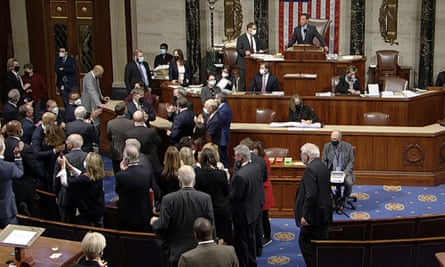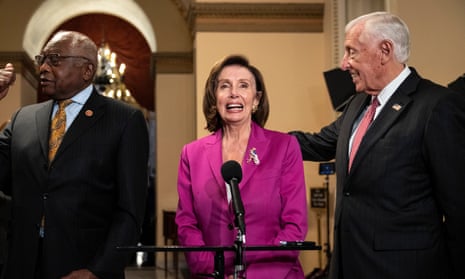House Democrats have passed a $1tn bill to rebuild the nation’s ageing infrastructure after months of delay, delivering Joe Biden a long-awaited legislative victory that he boasted would put the US “on a path to win the economic competition for the 21st century”.
Applause filled the chamber as a bipartisan group of lawmakers gave final passage to the measure late on Friday night, sending it to Biden’s desk. The vote was 228 to 206, with 13 Republicans supporting the bill and six leftwing Democrats opposing it.
Approval of the legislation fulfils one of the president’s central campaign promises to “build back better” in the wake of the coronavirus pandemic, as well as his vow to work across the aisle with Republicans, even as he pushes the rest of his agenda forward on a party-line basis.
In a second vote, held shortly after midnight, the House voted 221-213 to clear a procedural hurdle that paves the way for a final vote on a $1.75tn domestic policy and climate change bill, which they hope to pass before Thanksgiving.
“Tonight, we took a monumental step forward as a nation,” Biden said in a statement, expressing his desire to swiftly sign both measures into law. “Generations from now, people will look back and know this is when America won the economic competition for the 21st century.”
The pair of votes closed the curtain on a daylong saga that pitted House progressives against moderates, as Biden and Democratic leaders scrambled to salvage his agenda from yet another delay in a process beset by false starts.
Under the terms of a truce, brokered by Biden and Democratic leaders, progressives agreed to end their blockade against the infrastructure bill in exchange for a commitment from moderates to support the social policy and climate change package, known as the Build Back Better Act, in a vote later this month if an official estimate of its cost and economic impact are consistent with White House projections.
Marathon meetings on Capitol Hill and phone calls from the White House ultimately broke the logjam and yielded a deal between the party’s rival factions, which have been at odds for months over issues of policy and process.
With the political stakes as high as ever, Biden on Friday stepped deeper into the legislative fray and asked Democrats to trust him that both bills would become law. As negotiations dragged into the evening, Biden delayed a trip to his home in Delaware to remain in Washington to continue lobbying lawmakers.
In a statement, the president urged all members to vote for the infrastructure bill before them and promised that the House would advance on the broader package later this month.
It worked. Shortly thereafter, progressives and moderates issued separate statements agreeing to advance the legislation.
The five centrist holdouts in the House agreed to support the bill “as expeditiously as we receive the information” from the non-partisan Congressional Budget Office (CBO), but no later than 15 November. If there is a discrepancy between the cost estimates, the group said they remain committed to resolving them.
“As part of this agreement, at the request of the president, and to ensure we pass both bills through the House, progressives will advance the Infrastructure Investment and Jobs Act and the House rule on Build Back Better tonight,” the Washington congresswoman Pramila Jayapal, chair of the powerful Congressional Progressive Caucus, said in a statement.

The agreement marked a shift in position for progressives, who were under immense pressure from the White House and Democratic leaders to accept the deal. For months her caucus had pledged that it would only advance both bills together.
It remained unclear until late on Friday whether Democrats could mount enough support for the infrastructure proposal, in the face of Republican opposition and resistance from progressives, who have long made their support for the measure contingent on the passage of the larger, social policy and climate mitigation spending package.
“We had hoped to be able to bring both bills to the floor today,” the House speaker, Nancy Pelosi, said at an impromptu news conference earlier on Friday. Nevertheless, she insisted the House was on the cusp of a “historic” vote that would not only send the infrastructure bill to Biden’s desk, but would bring the party a “major step” closer to approving the social policy package. Expressing confidence, Pelosi said she had a “pretty good feel” about the evening’s vote.
“We’re in the best place ever, today, to be able to go forward,” she said.
The breakthrough came late into a chaotic day on Capitol Hill that began with Democrats confident they could advance the two central pillars of the president’s economic vision. But their ambitions were quickly dashed amid resistance from a small handful of moderate holdouts.
A plan to advance both pieces of legislation was upended by pushback from about half a dozen centrists, who demanded an official accounting of the spending bill, which had undergone substantial changes in recent weeks. Before giving their support, these lawmakers wanted to first see a cost analysis from the CBO, which could take weeks.
As tensions escalated throughout the day, Pelosi proposed a new strategy. In a letter to Democrats, she announced the House would hold two votes on Friday: one on the infrastructure measure and a procedural vote related to the spending package.
The change of course infuriated progressives, who had for months said they would not vote for the infrastructure bill without a simultaneous vote on the spending package. That position derailed two previous attempts to advance the infrastructure bill first.
“If our six colleagues still want to wait for a CBO score, we would agree to give them that time – after which point we can vote on both bills together,” Jayapal suggested in a statement earlier on Friday.
Unexpected losses in Virginia and elsewhere across the country earlier this week injected a sense of urgency into the deliberations, with Democrats eager to prove they could govern a year after voters gave them control of the White House and Congress.
With razor-thin majorities, Democrats need the support of every Democratic senator and nearly every House member. After accepting that she did not have the votes to advance both bills on Friday, Pelosi said the House would vote on the spending bill after the CBO figures are provided, in time, she hoped, for Congress to deliver a “Thanksgiving gift for the American people”.
Negotiations have seen the initial Biden spending proposal nearly halved from $3.5tn, with many provisions pared back or dropped entirely.
Biden, touting a strong monthly jobs report on Friday, implored House Democrats to “vote yes on both these bills right now”, arguing both pieces of legislation were critical to economic recovery.
“Passing these bills will say clearly to the American people, ‘We hear your voices, we’re going to invest in your hopes,” Biden said on Friday morning.
After his remarks, the president said he was returning to the Oval Office to “make some calls” to lawmakers.
Pelosi worked furiously throughout the day, hosting rounds of meetings with lawmakers, to pave the way for a vote before lawmakers leave Washington for a week-long recess, whipping members on the House floor and keeping them late into the night in an effort to shore up support for legislation that runs to more than 2,000 pages.
Progress on Biden’s agenda comes at a particularly difficult moment for the president. His approval ratings have slumped amid concerns over rising inflation, an unshakable pandemic and a harried withdrawal from Afghanistan. Biden departed for a pair of international summits without securing progress on domestic agenda, only to be met upon his return by news of his party’s poor showing in races across the country on Tuesday.
In Virginia, a state he won by 10 points in 2020, Republicans won the governor’s race, and came much closer than expected to denying the Democratic governor of New Jersey a second term. The grim results helped jolt Democrats into action on Capitol Hill, where leaders hope enacting their ambitious agenda will help the party regain momentum and improve their electoral prospects ahead of next year’s midterm elections.
The public works measure passed on Friday, substantial in its own right, passed the Senate in August with 19 Republican votes, including Senate minority leader, Mitch McConnell.

The five-year spending package provides $110bn in funding to upgrade the nation’s roads, bridges and highways; $39bn to modernise public transit, expanding the transportation systems and making it more accessible for people with disabilities, and $65bn to improve broadband access for Americans in rural areas, low-income families and tribal communities. It also includes provisions aimed at helping fortify the nation’s response to the climate crisis by building electric vehicle charging stations, modernising the electric grid and boosting carbon capture technologies.
If passed, the spending bill will go to the 50-50 Senate, where it will face new challenges. Two centrist Democrats, Joe Manchin and Kyrsten Sinema, have already thwarted many progressive initiatives and are expected to have further objections.
The months-long legislative battle has seen the initial spending proposal nearly halved from $3.5tn, with many provisions pared back or dropped entirely.
As drafted, the package would spend $1.85tn over 10 years to dramatically expand the nation’s social safety net, providing Americans assistance with the rising costs of healthcare, childcare and at-home elderly care. Medicare would be expanded to cover hearing aids while another provision would lower the cost of prescription drugs. At the heart of the sprawling legislation are plans to hasten the transition away from fossil fuels and limit planet-warming carbon emissions by incentivising electric vehicles, solar panels and wind turbines – all of which amounts to the largest US investment in clean energy.
To satisfy a range of policy demands, House Democrats added key initiatives that may ultimately be stripped out by the Senate, including a paid family leave program and work permits for immigrants. The White House has argued that the plan would be fully paid for by raising taxes on the wealthiest Americans and large corporations.
